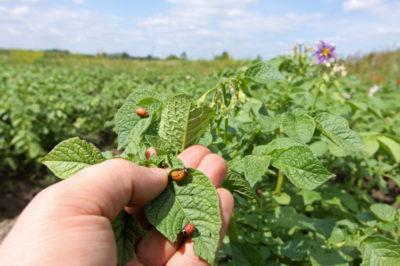Fresh, green vegetables are essential for the health and well-being of every person in your family. Unfortunately though, most of the vegetables that you find at the supermarket are cultivated with the help of chemical based fertilizers, pesticides, hormones, and various other unnatural means.
Thus, consumption of these vegetables may cause harm to your body over the course of a lifetime. There are many people who believe that the root cause of many diseases common in society is the chemicals and other harmful substances present in modern food items. Having your own vegetable garden is a good way to reduce this problem.
You can build your home vegetable garden in even the smallest of areas. You can spend around a quarter of an hour of your daily time to look after this garden.
Tackling Pests
A major problem faced by vegetable and fruit gardens is pests. Here, you can learn some tips to tackle this menace effectively. Here are some top tips for stopping pesky pests from getting more than their fair share of your garden crop.
- Using pest-resistant seeds is a good way to keep these harmful intruders away. There are heirlooms that are resistant to certain kinds of bugs and diseases, so do your research on which varieties are best.
- You can remove the pests by preparing the land in a systematic manner. One way to accomplish this is by opting for solarization. Here, the garden is cleared of all plants in the summer and tilled up to two inches. Then, the plot is covered with two layers of plastic sheets. This will increase the temperature in the ground to 120 degrees and will kill pests and their eggs.
- Learning about the potential pests that are common in your area is another way to be ready to tackle them head on. You can gain this information from farmers who have been engaged in agricultural activities in the area, government agencies engaged in the agricultural sector, and simply local websites that deal with the topic etc. Now, you can be prepared to tackle the pests during the time and season when they are at their destructive worst.
- Clearing all plant debris in a timely manner is essential to keep the pests away. The debris is a good hiding place for them to stay hidden from you. Again, some pests consume debris and thrive on them. You can convert the collected debris into compost and improve the fertility of your garden.
- Rotating vegetable items is known to help in fighting pests. If you grow the same crops again and again, it helps pests who thrive on them to multiply and wreak havoc. If you change crops after every season, it will help in fighting pests and also provide better yield. For example, if you planted cabbage at your vegetable garden during this season, next time, you may plant watermelon at the same plot.
- Growing multiple types of plants in your garden is known to help you to fight pests better. If you devote your entire garden to the same plant, then the pests that love that particular type of vegetable may come in a group and attack the whole crop. When multiple crops are involved, this risk is significantly reduced.
- Gaining the knowledge of the pests that attack your plants can help you to stay ahead of them. If your plants grow at any time of the year, then you can plant them during the season that is not preferred by pests. Some pests love summer months while some others prefer spring season. If you know what pests are the potential enemies of your plants, you can plant them according to the season.
- Pests are attracted by the smell of food. This is especially true of kitchen waste, and particularly animal waste. In many situations, people use uncomposted kitchen waste as fertilizer for their home garden, which can significantly increase certain kinds of pest attacks.
- Planting insect-repelling flowering plants can help you to keep certain types of pests away. Broccoli and celery are just two among the many plants with this property. Herbs like garlic, cloves etc. have the ability to keep some harmful pests away as well. My grandmother swore by planting marigolds among her tomatoes.
- Soapy water can kill many pests. But, you will have to spray this solution on to the pests. If you do this on a regular basis, it can help you to reduce pest infestation.
- Pests are mostly active during mornings and evenings. If you can spend some time and physically remove and kill pests seen on the leaves, it will help you gain a good crop.
- Application of certain commercially available oils can kill pests. These oils do not adversely affect the plants.
- You must remove weeds at regular intervals. In addition to stealing the fertilizers given for plants, they provide a hiding place for pests to thrive.
- Whenever you see signs of pest infestation on any leaves or branches, prune them immediately and burn them. Application of pesticides (organic if at all possible) at the affected part may be necessary.
- As you and your family members are consuming the fruits and vegetables grown in your home garden, it is better to follow organic farming system and avoid the use of insecticides. Compost created from kitchen waste is a good source of nutrition for plants. You can opt for this compost in place of chemical based fertilizers.
- In case your organic methods are not succeeding in keeping the pests away, you may have to opt for chemical pesticides. Learn about the pests and use the appropriate amounts of pesticides suitable for each type of pests. There are certain pesticides made from natural, plant-based substances, and thus they have less human and environmental impact.

